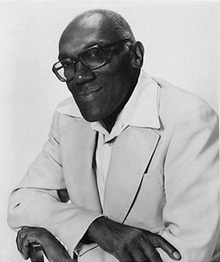Bullmoose Jackson
| Bull Moose Jackson | |
|---|---|
 |
|
| Background information | |
| Birth name | Benjamin Joseph Jackson |
| Also known as | Benjamin Clarence Jackson, Jr. |
| Born |
April 22, 1919 Cleveland, Ohio, United States |
| Died | July 31, 1989 (aged 70) Cleveland, Ohio, United States |
| Genres | Jump blues, dirty blues, R&B |
| Occupation(s) | Singer, saxophonist |
| Instruments | Vocals, saxophone |
| Years active | 1943–89 |
| Notable instruments | |
| Saxophone | |
Benjamin Clarence "Bull Moose" Jackson (April 22, 1919 – July 31, 1989) was an American blues and rhythm-and-blues singer and saxophonist, who was most successful in the late 1940s. He is sometimes considered a performer of dirty blues, because of the suggestive nature of some of his songs, such as "I Want a Bowlegged Woman" and "Big Ten Inch Record".
Jackson was born Benjamin Joseph Jackson in Cleveland, Ohio. He played violin as a child but quickly became drawn to the saxophone and started his first band, the Harlem Hotshots, while he was still in high school. In 1943, he was recruited as a saxophonist by the bandleader Lucky Millinder, and the musicians in Millinder's band gave him the nickname "Bull Moose" for his appearance. He began singing when he was required to stand in for Wynonie Harris at a show in Texas.
Millinder encouraged Jackson to sign a solo contract with Syd Nathan of King Records to play rhythm and blues. The first recording in his own right was "I Know Who Threw the Whiskey", in 1946, an answer song to Millinder's "Who Threw the Whiskey in the Well". The following year, his recording of "I Love You, Yes I Do" reputedly became the first R&B single to sell a million copies, holding the number 1 spot on the R&B chart for three weeks and crossing over to the pop chart, where it reached number 24.
He formed his own group, the Buffalo Bearcats, and over the next five years recorded in a wide variety of musical styles, including both romantic crooning and bawdy jump blues. His big hits in 1948 included the double-sided hit "All My Love Belongs to You" / "I Want a Bowlegged Woman", and his biggest R&B chart hit, "I Can't Go on Without You", which stayed at number 1 on the R&B chart for eight weeks. He also made an appearance in the 1948 film Boarding House Blues, with Millinder.
...
Wikipedia
